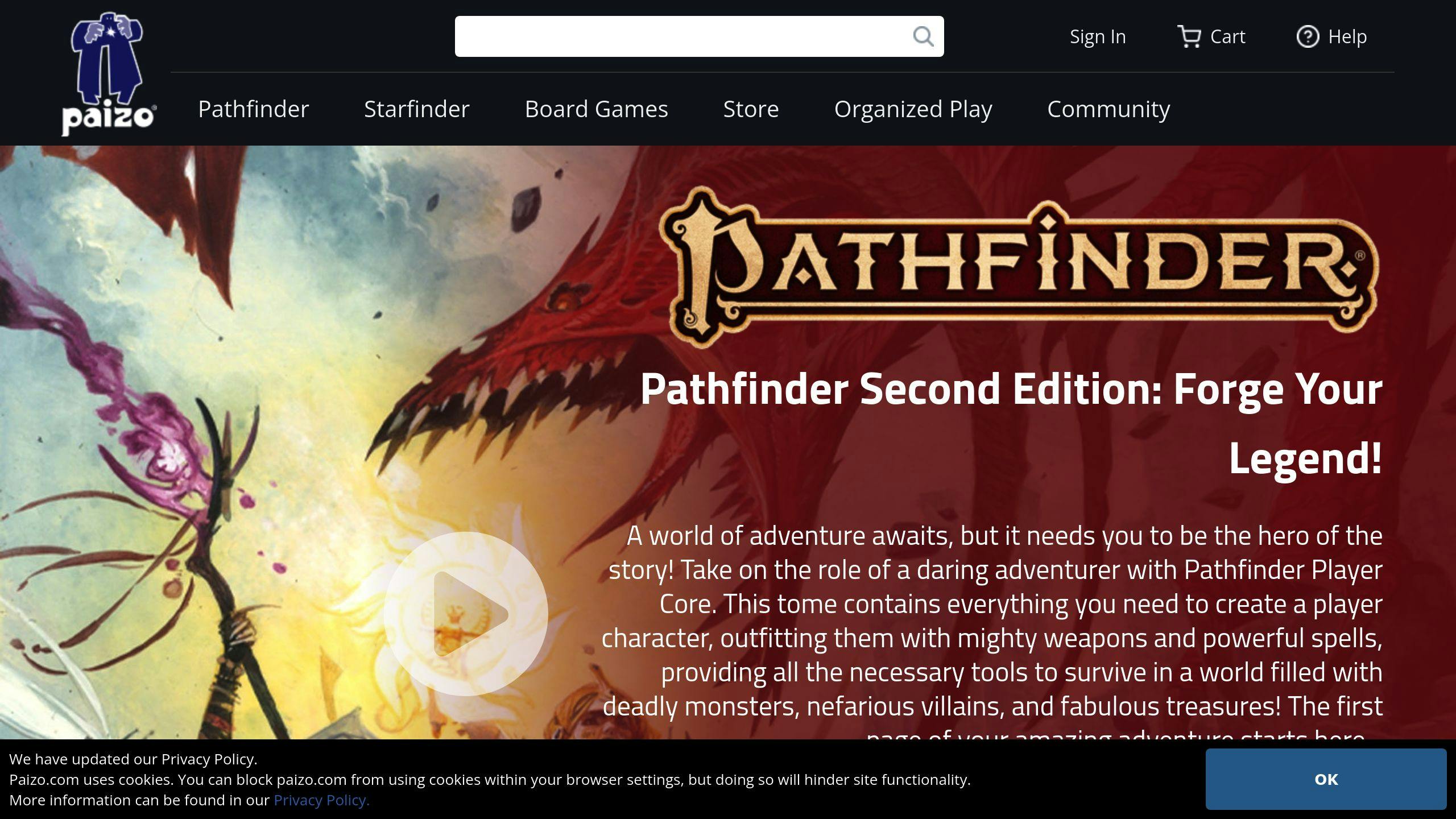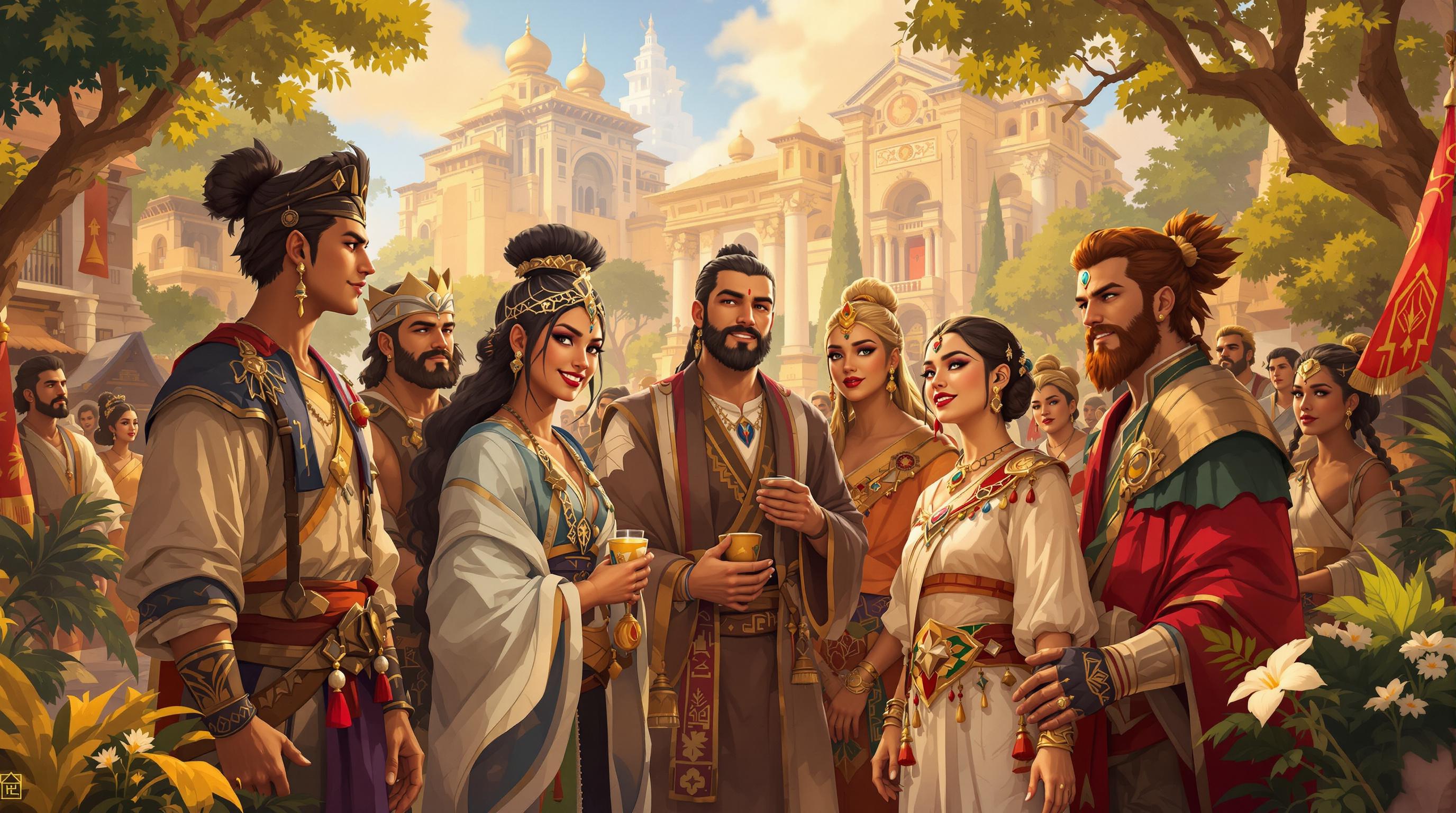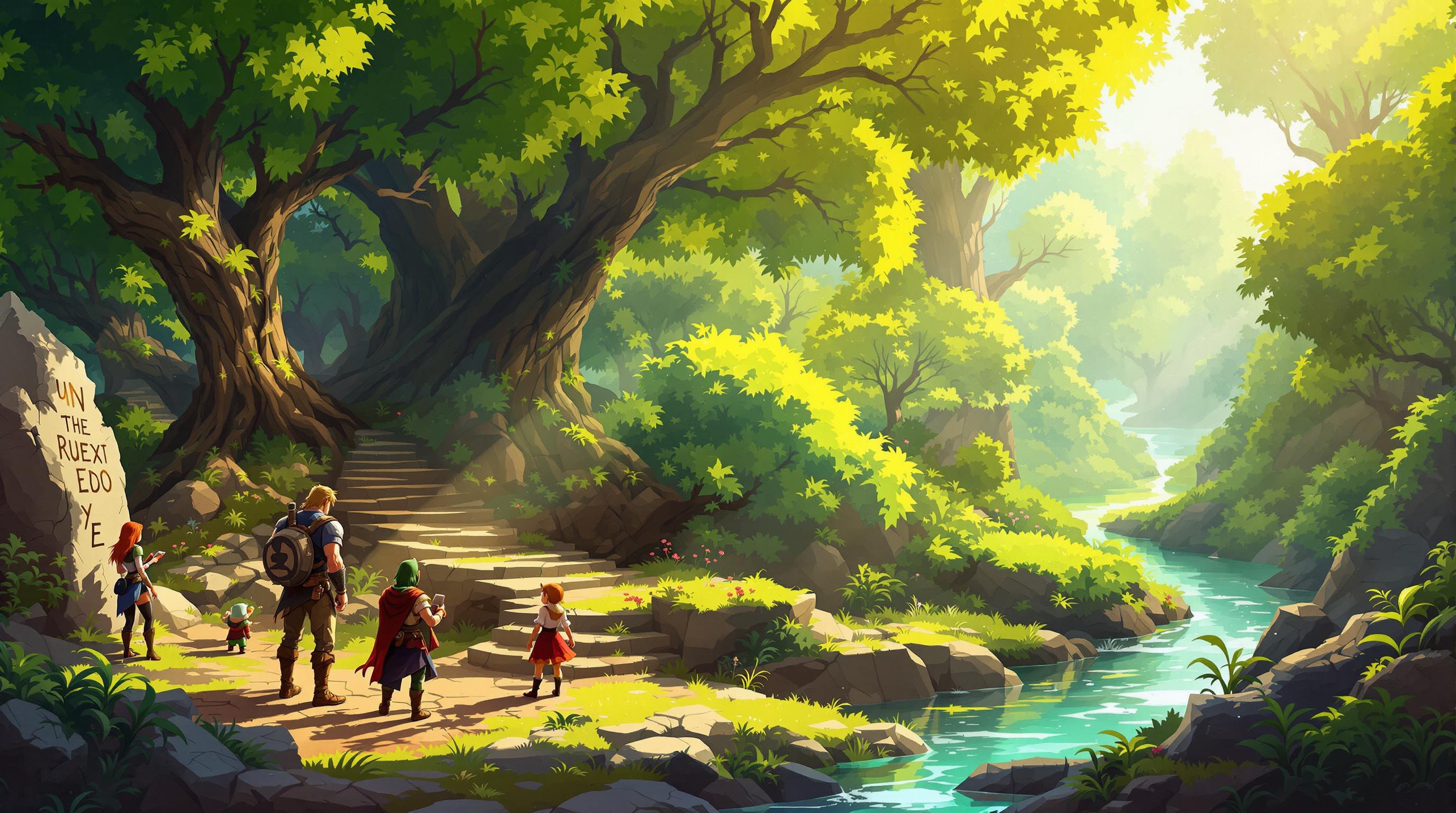Looking to dive into fantasy tabletop roleplaying games? Here's a quick comparison of three popular systems:
-
Dungeons & Dragons 5E (D&D 5E)
- Easy to learn
- Focuses on storytelling
- Uses a d20 system
-
Pathfinder 2nd Edition (PF2)
- More complex rules
- Highly customizable characters
- Tactical combat
-
Fate System
- Narrative-driven
- Flexible for different settings
- Uses special Fate dice
Quick Comparison:
| Feature | D&D 5E | Pathfinder 2E | Fate System |
|---|---|---|---|
| Complexity | Low | High | Medium |
| Character Options | Moderate | Extensive | Flexible |
| Combat Focus | Balanced | Tactical | Narrative |
| Magic System | Spell slots | Spell slots with heightening | Narrative-based |
| Best For | Beginners | Number-crunchers | Storytellers |
Choose D&D 5E if you're new, Pathfinder 2E if you love details, or Fate if you prioritize storytelling. Try free versions to see what fits your group best.
Related video from YouTube
1. Dungeons & Dragons 5E
Dungeons & Dragons 5th Edition (D&D 5E) hit the scene in 2014, breathing new life into the classic fantasy tabletop RPG. It's a hit with newbies and veterans alike, thanks to its user-friendly rules and focus on spinning epic tales.
Core Rules
At its heart, D&D 5E is all about the d20. Roll that 20-sided die, toss in some modifiers, and boom - you've got your outcome. This applies to everything from swinging a sword to sweet-talking a dragon.
D&D 5E keeps things in check with "bounded accuracy." In plain English? Your bonuses don't go through the roof as you level up. This means the math stays simple, and even low-level baddies can still give high-level heroes a run for their money.
Making Characters
Creating a character in D&D 5E is like building your own fantasy hero from the ground up. Here's the quick and dirty version:
- Pick your race (Fancy being a Dwarf? An Elf? Maybe a Human?)
- Choose your class (Barbarian? Wizard? The choice is yours)
- Roll those ability scores
- Select a background (Were you a noble? A criminal? A sage?)
- Gear up
One of the cool things about D&D 5E? You get most of your character's key features early on. By level three, you've got a pretty good idea of who your character is and where they're headed.
"Though D&D can come across as incredibly overwhelming to begin with – there is a lot to take in to begin with – it's not impossible for a complete newbie to pick the game up quickly." - Dicebreaker
How Combat Works
Combat in D&D 5E is fast and furious. It's turn-based, with everyone acting in order based on their initiative roll. On your turn, you can move, take an action (like attacking or casting a spell), and maybe squeeze in a bonus action.
Attacking is straightforward: roll a d20, add your modifiers, and see if you beat the target's Armor Class. If you do, you hit and roll for damage.
D&D 5E also throws in advantage and disadvantage to spice things up. With advantage, you roll two d20s and take the higher number. Disadvantage? Take the lower. It's a simple way to add depth without complicating things.
Magic System
Magic is a big deal in D&D 5E. In fact, 9 out of 13 classes can sling spells. The system uses spell slots - think of them as magical fuel that spellcasters burn to cast spells. Different classes recharge their spell slots in different ways, usually by taking a breather (short rest) or a good night's sleep (long rest).
Spells come in different levels, from cantrips (level 0) all the way up to mind-bending 9th level spells. As you level up, you get access to more powerful spells and more spell slots to cast them with.
Casting a spell that needs an attack roll? It works just like swinging a sword - roll that d20 and add your modifiers. For other spells, the target might need to make a saving throw to avoid or lessen the effects.
D&D 5E's magic system gives you the power to reshape reality without drowning you in complex rules. It's all about finding that sweet spot between flexibility and simplicity.
2. Pathfinder 2E

Pathfinder 2nd Edition (PF2E) is a fantasy tabletop RPG that takes the original Pathfinder and cranks it up a notch. Released in 2019 by Paizo Inc., it's all about giving players more options and smoother gameplay.
Core Rules
The heart of PF2E? Its three-action system. On your turn, you get three actions. Simple as that. But don't let the simplicity fool you - it's a game-changer.
Jason Bulmahn, Game Master, puts it this way: "Knowing the best way to play a turn can mean the difference between life and death!"
You'll be rolling d20s to see if you succeed or fail. But here's the kicker: you can critically succeed or critically fail too. It adds a whole new layer to every roll.
And skills? They've got four levels: Trained, Expert, Master, and Legendary. It's like leveling up your character's abilities.
Making Characters
Creating a character in PF2E is like building your own hero from the ground up. Here's what you'll pick:
- Concept
- Ancestry (fancy word for "Race")
- Heritage
- Background
- Class
Each ancestry gives you different perks. Check this out:
| Ancestry | Ability Boosts | Ability Flaw | Starting HP |
|---|---|---|---|
| Dwarf | Constitution, Wisdom, free | Charisma | 10 |
| Elf | Dexterity, Intelligence, free | Constitution | 6 |
| Human | Two free | None | 8 |
Classes? They've got plenty. Want to throw bombs? Play an Alchemist. Prefer to smash things? Go Barbarian. Like to sing your enemies to death? Bard's your jam.
But here's the real kicker: feats. You get them at every level, letting you customize your character non-stop.
How Combat Works
Combat in PF2E is like a chess match with swords and fireballs. That three-action system we talked about? It lets you do cool combos like move, attack, and raise your shield all in one turn.
Gideon from Gideon's Gaming points out: "The important aspect of the action economy is your party has four times the actions a single monster does." That's a big advantage if you play it smart.
Some other combat tricks:
- Multiple attack penalty: The more you swing, the harder it gets to hit.
- Critical hits: Beat the target's AC by 10 or more and you'll do some serious damage.
- Reactions: Special moves you can pull off even when it's not your turn.
Magic System
Magic in PF2E comes in four flavors: Arcane, Divine, Occult, and Primal. Different classes tap into different types of magic.
Spells work on a slot system, but with a twist. You can "heighten" spells to make them more powerful. So that fireball you learned at level 5? It can still pack a punch at level 15.
And don't forget about magic items. In PF2E, they're not just nice to have - they're part of your character's growth.
Now, a word of warning: PF2E isn't a game you'll master overnight. It's got depth, and that means it takes time to learn. But for players who love to dive deep into rules and character options, it's a goldmine of possibilities.
sbb-itb-b8b00a5
3. Fate System

Fate System brings a fresh spin to tabletop roleplaying. It's all about storytelling and teamwork. Let's break it down.
Core Rules
Fate keeps it simple. You roll four special dice with pluses, minuses, and blanks. Add your skill rating, compare to a target or opponent's roll. Done.
But here's the kicker: Aspects. These are short phrases that sum up key traits. Like "Ex-soldier haunted by war". You can use these for bonuses or to spice up the story.
Skills and results use a ladder from Terrible (-2) to Legendary (+8). It's just easier to get than a bunch of numbers.
Making Characters
Creating characters in Fate is a team effort. Here's how:
- Come up with a High Concept (who you are) and a Trouble (what complicates things).
- Create three aspects based on past adventures, including how you've mixed with other characters.
- Pick skills (Fate Core) or approaches (Fate Accelerated).
- Choose stunts - special abilities that bend the rules.
Check out this Fate Accelerated character:
| Charlie Epps, Math Genius |
|---|
| High Concept: Aging Child Math Prodigy, wondering what it's all about |
| Trouble: If I'm no longer the Boy Wonder, then what am I? |
| Approaches: Clever +3, Careful +2, Quick +2, Flashy +1, Sneaky +1, Forceful +0 |
| Stunt: Once per session, I can use Math to figure out where the bad guys are or will be. |
How Actions Work
Fate boils actions down to four types:
- Overcome obstacles
- Create an Advantage
- Attack
- Defend
The difference between your roll and the target? That's called shifts. More shifts mean you did better.
Special Abilities
Stunts let you bend the rules. Maybe you get +2 when using Quick to dodge attacks.
Then there's Fate Points. Spend them for bonuses, power stunts, or even change the story. You earn them when your aspects cause trouble. It's a give-and-take of story control.
"In Fate, you can treat anything in the game world like it's a character. Anything can have aspects, skills, stunts, stress tracks, and consequences if you need it to." - Josh Walles, Game Designer
This flexibility sparks creativity. Imagine a city with "Labyrinthine Streets". Players could use that when trying to lose a tail.
Fate's focus on storytelling and teamwork makes it perfect for groups who love crafting rich tales together. It might take some getting used to, but it offers a unique roleplaying experience.
What Works and What Doesn't
Let's dive into the strengths and weaknesses of Dungeons & Dragons 5E, Pathfinder 2E, and the Fate System. Each has its own flavor, so let's see what makes them tick.
Dungeons & Dragons 5E
D&D 5E is the cool kid on the block. Here's why:
- It's a breeze to learn. New players? No problem.
- There's a ton of stuff out there. Books, online resources, you name it.
- The math stays simple, so you're not drowning in numbers.
But it's not all sunshine and rainbows:
- Want to tweak your character to the nth degree? You might feel a bit boxed in.
- Combat can feel a bit... vanilla sometimes.
Pathfinder 2E
Pathfinder 2E is for those who like to tinker. Check it out:
- You can customize your character like crazy. Feats galore!
- Combat feels like a chess match. Every move counts.
- Your character grows like a weed. Level ups feel GOOD.
The downsides? Well:
- It's not exactly "pick up and play". There's a learning curve.
- Combat can drag on. Hope you're not in a hurry.
Fate System
Fate is all about the story. Here's the scoop:
- It's a storyteller's dream. Your narrative chops will shine.
- Want to play in space one week and a fantasy realm the next? Fate's got you covered.
- The rules? They're not gonna make your head spin.
But keep in mind:
- If you like your rules crunchy, you might find Fate a bit... mushy.
- Combat is more "describe your cool move" than "I attack with my +2 sword".
Let's break it down in a table:
| Feature | D&D 5E | Pathfinder 2E | Fate System |
|---|---|---|---|
| Easy to learn? | You bet | Not so much | Pretty much |
| Rules complexity | Keep it simple | Hope you like reading | Bare bones |
| Character tweaking | Some options | Go nuts | It's all about concept |
| Combat depth | Middle of the road | Tactical heaven | More about the story |
| Story focus | It's there | It's there, but... | Front and center |
| Community size | Massive | Decent | Smaller, but passionate |
Kenny Kimberly, who knows a thing or two about game design, says: "The current edition of D&D is specifically designed with approachability in mind." No kidding. That's why newbies flock to it.
Now, if you want to get your nerd on, Pathfinder 2E might be your jam. The Mary Sue puts it like this: "Pathfinder cements itself as the clear choice for many pro-nerds due to its extensive array of character customization options."
Fate? It's a different beast altogether. If your group is all about spinning yarns, it's perfect. But if you live for those tactical battles, you might find it lacking.
So, what's the bottom line? If you're new to this whole TTRPG thing or want a bit of everything, D&D 5E is solid. Craving depth and don't mind a challenge? Pathfinder 2E's got your back. And if your group values a good story above all else, give Fate a shot.
Which Game Fits Your Style
Picking the right tabletop RPG? It's like choosing your favorite ice cream flavor. Let's break it down:
Newbies, Listen Up
Dungeons & Dragons 5E is your go-to. It's the "training wheels" of TTRPGs. Easy rules, quick character creation. You'll be rolling dice and slaying goblins in no time.
Number Crunchers, This One's For You
Love details? Pathfinder 2E is your jam. 23 classes, feats galore. It's a math lover's playground. One player put it this way:
"If you and your party enjoy a mechanics-heavy approach with a lot of build options that reflect character growth, you'll probably have a better time with Pathfinder."
Story Junkies, We've Got You
All about the narrative? Check out the Fate System. It's like a Swiss Army knife for storytelling. Switch genres on the fly, focus on the tale, not the rules.
Quick Picks
| You Want | Go For |
|---|---|
| Easy learning curve | D&D 5E |
| Tons of options | Pathfinder 2E |
| Story-first approach | Fate System |
| Tactical fights | Pathfinder 2E |
| Mix of everything | D&D 5E |
Here's the deal: the best game is the one your group loves. Chat with your friends. What do they want? Many games have free versions. Try before you buy.
Bottom line? Whether you're fighting dragons or solving mysteries, it's about having a blast with your buddies. Pick a game that gets you excited. Now go roll some dice!


